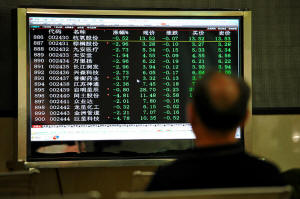State-backed 'national team' of investors piles in to support China
stocks
 Send a link to a friend
Send a link to a friend
 [January 31, 2024] (Reuters)
- A rescue operation is underway in China's equity markets with large
and unusual flows into blue-chip funds suggesting a plunge by
state-backed investors. [January 31, 2024] (Reuters)
- A rescue operation is underway in China's equity markets with large
and unusual flows into blue-chip funds suggesting a plunge by
state-backed investors.
It is unclear exactly who is buying, or whether their pockets are deep
enough to turn around the sliding market.
But analysts say the purchasing pattern points to the so-called
"national team" of state-backed investors, several of whom have said
recently they have turned buyers.
THE FLOW
More than $17 billion flowed to four Chinese-domiciled exchange traded
funds tracking the CSI 300 index in the month to Jan. 26, S&P Global
Market Intelligence found.
It found only the S&P 500 - a market eighteen times larger - has drawn
greater inflows, receiving about $20 billion, and that no offshore CSI
300 tracker drew comparably heavy buying.
Goldman Sachs said last week's domestic ETF inflows were the biggest
since 2015.
For example, assets under management (AUM) of the E Fund CSI300 Index
ETF jumped more than 70% this month alone to 81.6 billion yuan ($11.37
billion).
Heavy inflows were also seen in other big-cap ETFs such as Huatai-PB
CSI300 ETF, ChinaAMC CSI 300 ETF and Harvest CSI300 ETF.

Meanwhile, foreign investors sold 18.2 billion yuan worth of China
stocks via the cross-border Connect scheme in January, the sixth
consecutive month of net selling.
WHY IT'S IMPORTANT
Signs of state-backed buying are the latest indication of increased
official efforts to stem the decline and similar support in 2015
steadied markets - albeit temporarily.
[to top of second column] |

A man sits in front of a screen displaying stock information at a
brokerage house in Jinhua, Zhejiang province, China August 2, 2019.
REUTERS/Stringer

THE CONTEXT
China's stockmarkets have been tanking. The CSI 300 on Wednesday
notched a record sixth straight monthly decline amid a gloomy
outlook for real estate and the economy.
Goldman Sachs defines the "national team" as government-related
entities that hold domestic equities on behalf of the state. It
formed in response to a market crash in 2015 and includes investors
such as Central Huijin and the China Securities Finance Corp.
MARKET VIEW
Analysts expect state-sanctioned stock buying can only do so much
and fundamental problems such as oversupply and a lack of confidence
in property ownership must be rectified to improve things.
However, the signal that authorities are taking the rout seriously
may suggest that a floor has been reached.
"If the stock index pulls back further, the 'national team' may ramp
up its buying scale to provide downside protection," said analysts
at UBS.
($1 = 7.1788 Chinese yuan renminbi)
(Reporting by Reuters' Shanghai newsroom, Nell Mackenzie in London,
Summer Zhen in Hong Kong and Gaurav Dogra in Bengaluru; Writing by
Tom Westbrook; Editing by Miral Fahmy)
[© 2024 Thomson Reuters. All rights
reserved.]
This material may not be published,
broadcast, rewritten or redistributed.
Thompson Reuters is solely responsible for this content.
 |